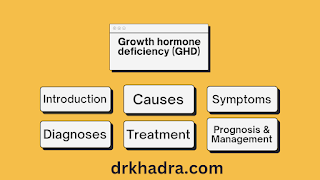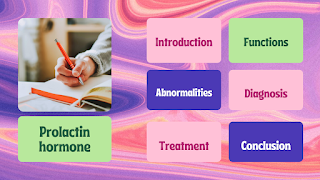Introduction
Growth hormone deficiency (GHD) is a rare condition where the body doesn't produce enough growth hormone (GH). This essential hormone plays a crucial role in several bodily functions, including:
●Growth and development: It stimulates bone growth and tissue repair, leading to proper growth in children and adolescents.
●Metabolism: It regulates blood sugar levels, fat metabolism, and muscle mass.
●Immune function: It helps maintain a strong immune system.
significance of GH for height, metabolism, and other bodily functions.
Height:
In children and adolescents, it is essential for bone growth and development, leading to increased height. It stimulates the growth plates in bones, allowing them to lengthen and extend. After the growth plates fuse, typically around late teens, GH's influence on height diminishes.
Metabolism:
It acts as a metabolic regulator, influencing how your body uses and burns calories. It stimulates lipolysis, the breakdown of fat for energy, and promotes muscle growth, which further increases calorie expenditure. This can lead to weight loss and a more sculpted physique.
Other Bodily Functions:
GH's influence extends far beyond height and metabolism. It has a hand in a multitude of bodily processes, including:
Bone density: It promotes bone formation and mineralization, reducing the risk of osteoporosis.
Immune function: It strengthens the immune system, enhancing the body's ability to fight off infections and diseases.
Sleep: it plays a role in regulating sleep patterns, promoting deeper sleep which is essential for overall health and well-being.
Mood and cognitive function: It can improve mood, reduce symptoms of depression and anxiety, and enhance cognitive function, including memory, learning, and focus.
Causes
Growth hormone deficiency can be caused by various factors, such as
●Genetic Factors: Inherited genetic mutations can interfere with the normal production or function of growth hormone.
●Brain Tumors: Tumors in the pituitary gland or hypothalamus can disrupt the release of growth hormone.
●Brain Injury: Damage to the hypothalamus or pituitary gland due to injury or trauma can lead to growth hormone deficiency.
●Infections: Certain infections affecting the brain can impact the production of growth hormone.
●Autoimmune Disorders: Conditions where the immune system mistakenly targets and damages the cells that produce growth hormone.
●Radiation Therapy: Treatment for brain tumors or other conditions involving radiation can affect the pituitary gland and disrupt growth hormone production.
●Severe Illness: Critical illnesses during childhood can sometimes impair the production of growth hormone.
●Certain Medications: Long-term use of specific medications, such as corticosteroids, can contribute to growth hormone deficiency.
●Poor Blood Supply: Insufficient blood flow to the pituitary gland can hinder its ability to produce hormones, including growth hormone.
●Unknown Causes: In some cases, the exact cause of growth hormone deficiency may not be identified.
Symptoms
Growth hormone deficiency may manifest through various symptoms such as
In children:
● Short stature and delayed growth.
● Babyish appearance and delayed puberty.
● Low energy levels and fatigue.
● Difficulty gaining weight or muscle mass.
● Delayed tooth eruption.
In adults:
●Weight gain and fat accumulation, especially around the abdomen.
● Decreased muscle mass and strength.
● Osteoporosis and increased risk of fractures.
● Fatigue and low energy levels.
● Depression and mood swings.
● Dry skin and hair.
● Sexual dysfunction.
Diagnoses
Diagnosing growth hormone deficiency involves a thorough evaluation by a healthcare professional. This typically includes a review of medical history, physical examination, and specialized tests such as growth hormone stimulation tests or insulin-like growth factor (IGF-1) measurements. MRI scan of the pituitary gland. These assessments help determine if there is an insufficient production or secretion of growth hormone, leading to growth issues. Always consult with a healthcare provider for accurate diagnosis and guidance.
Treatment
• Explain the importance of early diagnosis and treatment.
• Focus on growth hormone replacement therapy:
• Administered through injections.
• Dosage individualized based on age and severity.
• Potential side effects.
• Briefly mention other supportive measures:
• Nutritional counseling.
• Exercise program.
• Psychological support.
Prognosis and Long-term Management
Discuss the positive outcomes of treatment, including improved growth, metabolism, and quality of life.
Emphasize the need for ongoing monitoring and adjustments to therapy throughout life.
Prolactin hormone
Introduction
Prolactin is a hormone produced by the pituitary gland in the brain. It plays a key role in various functions, especially in females. Primarily known for stimulating milk production during breastfeeding, prolactin also influences reproductive processes and has effects on the immune system.
Functions
Primary Functions:
● Lactation: stimulates milk production in mammary glands
● Breast development: promotes growth and development of breast tissue
● Other Functions:
• Regulates fluid balance and electrolyte levels
Influences metabolism and immune function
Affects reproductive function (both male and female)
• Plays a role in bone health and mineral metabolism
•May be involved in behavior and mood regulation
Factors influence prolactin levels
Its levels can be influenced by various factors.
•Stress,
•pregnancy,
•breastfeeding,
•sleep patterns,
•and certain medications can impact prolactin production. Additionally, conditions like hypothyroidism and pituitary gland disorders may also affect prolactin levels in the body.
Factors that decrease its levels:
•Dopamine
•Sex hormones (estrogen and progesterone)
•Certain medications
Regulation of Prolactin Secretion
Controlling the Flow of Prolactin: A Balancing Act
Prolactin, a versatile hormone produced in the pituitary gland, plays crucial roles in reproduction, lactation, and even immunity. But how does the body fine-tune its production of this powerful molecule? It's all about a delicate dance of inhibition and stimulation, orchestrated by various players.
The Star Inhibitor: Dopamine
Think of dopamine as the brakes on prolactin release. Produced in the hypothalamus, a brain region that acts as the body's command center, dopamine travels to the pituitary gland and whispers sweet nothings to prolactin-producing cells, telling them to chill out. This constant inhibitory signal keeps prolactin levels in check during most of the day.
Other Players Join the Stage:
While dopamine takes the lead, there's a supporting cast influencing prolactin secretion.
The Encouragers: Hormones like estrogen and thyroid hormones can give prolactin a gentle nudge, increasing its release. This is especially important during pregnancy and lactation, when high prolactin levels are needed for milk production.
The Mood Modulators: Stress hormones like cortisol and adrenaline can also influence prolactin, with some studies suggesting they might elevate its levels.
Beyond Hormones: The Environmental Influence
Beyond chemical messengers, other factors can sway prolactin's dance.
Sleep: Deep sleep is prolactin's favorite time to shine, with levels naturally rising during the night. This might explain why prolactin can be elevated in people with sleep disorders.
Physical Activity: Exercise, especially intense workouts, can temporarily boost prolactin, although the long-term effects are less clear.
Food: Spicy foods and certain herbal supplements might also have a transient impact on prolactin levels.
The Bottom Line:
Prolactin secretion is a complex affair, dictated by a symphony of inhibitory and stimulatory signals. Dopamine takes center stage, but other hormones, lifestyle factors, and even the time of day can influence its production, ensuring this versatile hormone plays its part in maintaining our health and well-being.
Abnormalities
Hyperprolactinemia: elevated prolactin levels
Causes: pituitary tumors, medications, hypothyroidism, stress
Symptoms: infertility, menstrual irregularities, galactorrhea (milk production in non-pregnant women)
Hypoprolactinemia: low prolactin levels
Causes: pituitary damage, certain medications
Symptoms: delayed lactation, menstrual irregularities
Diagnosis and Treatment
Prolactin disorders involve issues with the hormone prolactin, which is produced by the pituitary gland. Elevated levels can cause symptoms like irregular periods, infertility, and breast milk production in non-pregnant individuals.
Diagnosis typically includes blood tests to measure prolactin levels. Imaging, such as MRI, may be done to check for any pituitary abnormalities. Treatment depends on the underlying cause. Medications, like dopamine agonists, are commonly used to lower prolactin levels. In some cases, addressing the root cause, such as managing stress or adjusting medication, is necessary. Regular follow-ups and monitoring are crucial for effective management.
Conclusion
Prolactin is a complex and multifaceted hormone with important roles in numerous bodily functions.
Understanding prolactin is essential for various health concerns, particularly reproductive health and lactation.
Ongoing research continues to reveal more about the diverse functions and regulation of this key hormone.



Post a Comment